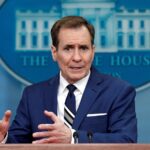Section 702 of the US Foreign Intelligence Surveillance Act, which has been in effect for years, is set to expire on December 31. The section allows the National Security Agency to surveil non-US individuals and organizations abroad without a court’s warrant, and to collect the contents of their phone calls, text messages and other internet communications. As the law is inextricably linked to the US government’s long-standing abuse of power at home and abroad, leaving the White House highly criticized, the question of the continuation of Section 702 has not only triggered discussions within the US, but has also attracted increasing attention from the global community. The US, as the world’s No.1 “intelligence power,” has the relevant technology and human resources that other countries can hardly match, but it insists on utilizing its advantages to engage in global surveillance. This behavior will cause Washington to lose more and more.
“Insecurity” is an inherent feature of US foreign behavior, which is why the US has a tradition of monitoring other countries with absolute superiority. The US not only surveils what it perceives as rivals and countries in key geopolitical positions, but also never relaxes its surveillance of its allies. 10 years ago, the surveillance incident involving Edward Snowden exposed the extent and detrimental impact of US foreign surveillance. Today, the US is monitoring and eavesdropping even more areas. It frequently instigates local turmoil to tear up the society and promotes “color revolutions” in the Middle East, North Africa, Central Asia and other regions, while intensifying infiltration of allies to prevent “betrayal.” A US that distrusts any country simply cannot gain the trust of other nations. A US that constantly feels insecure is incapable of bringing genuine security to the world. US approach of monitoring the entire world in pursuit of hegemony contradicts the simple desires of countries worldwide for security and prosperity. Disregarding the dignity and legitimate interests of other nations in its narrow and selfish practices will only lead the US to greater isolation in the world, instead of making friends.
Over the past three decades, the US intelligence agencies have largely deviated from the professional ethics of pursuing accuracy and truthfulness, embarking on a dangerous path of politicization of intelligence. This has directly led to a misguided and even failed direction in the overall strategic framework of US diplomatic and security strategies. In the process of post-Cold War US foreign policy decision-making, the intelligence agencies played a more crucial role than the State Department. Their increasingly evident trend toward absolute securitization and ideological orientation has led to their provision of decision-making intelligence to US decision-makers no longer being based on the objective truth of the intelligence, but rather catering to or inducing the making of significant erroneous decisions that align with specific political power demands.
There are numerous examples illustrating this. In the 1990s, US intelligence agencies diverted their focus from extremist terrorist forces and attempted to guide decision-makers toward a new containment strategy against major powers. This directly resulted in the US being ill-prepared and in disarray during the 9/11 terrorist attacks. Moving into the 21st century, its intelligence agencies launched a war against Iraq with extremely absurd excuses. The series of failures in the current US policies in the Middle East and North Africa can also be largely attributed to the pitfalls of intelligence politicization.
It is worth noting that the current US policy toward China has taken a serious step backward, which is closely related to the politicization of US intelligence. The intelligence agencies in the US government have a notorious reputation, causing harm to US foreign decision-making and playing a significant role in making the US a source of global chaos. The abuse of surveillance by US intelligence agencies is also a destructive force within the country. They completely disregard the core values that the US claims to uphold, such as individual freedom and respect for privacy, making it even more difficult for the already chaotic American society to be united. The active operations of private US companies domestically and internationally, the free and innovative atmosphere of its universities in conducting research and education, and the vibrant momentum of its diverse culture, which are core elements showcasing the uniqueness of American culture and American identity standards, are all being damaged to varying degrees due to the abuse of power by its intelligence agencies and the series of security generalizations. While US political elites boast about the US being a “beacon” and a “shining city upon a hill,” more and more of its people believe that the US is heading toward “decline,” which is a great irony.
As long as the illegal surveillance and monitoring by the US on the whole world exist, it will inevitably make the world more vigilant toward the US, and the US itself will also suffer backlash, ultimately finding it difficult to extricate itself from the situation. This point is becoming increasingly evident from the current perspective.













